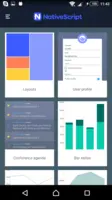Overview
What is NativeScript?
NativeScript is an open source framework that allows you to create native iOS and Android apps, with one codebase, using the web skills you already have (JavaScript and CSS) and the libraries you already love.
Recent Reviews
Awards
Products that are considered exceptional by their customers based on a variety of criteria win TrustRadius awards. Learn more about the types of TrustRadius awards to make the best purchase decision. More about TrustRadius Awards
Pricing
Entry-level set up fee?
- No setup fee
For the latest information on pricing, visithttps://www.nativescript.org/nativescri…
Offerings
- Free Trial
- Free/Freemium Version
- Premium Consulting/Integration Services
Would you like us to let the vendor know that you want pricing?
1 person also want pricing
Alternatives Pricing
Product Demos
NativeScript Realtime Development
YouTube
How to Build Apps with NativeScript
YouTube
7 - Optimizing the Startup time of NativeScript Angular Apps
YouTube
NativeScript & WordPress REST API Demo LiveSync
YouTube
How to Build Enterprise Apps with Kinvey & NativeScript Demo
YouTube
Optimizing startup time of NativeScript Angular apps
YouTube
Product Details
- About
- Competitors
- Tech Details
- Downloadables
What is NativeScript?
NativeScript is an open source framework that allows
you to create native iOS and Android apps, with one codebase, using the web
skills you already have (JavaScript and CSS) and the libraries you already
love.
NativeScript Features
- Supported: Reuse web skills (JavaScript, CSS) to create truly native mobile apps for iOS and Android
- Supported: Deep integration with popular JavaScript frameworks like Angular or Vue to minimize learning curve
- Supported: Extensive code sharing between mobile platforms (including UI) and web apps (when used with Angular)
- Supported: Deliver high-quality mobile apps to multiple platforms faster, using web developers you already have
NativeScript Screenshots
NativeScript Video
This spring and summer have been full of new NativeScript features, tooling options, and improvements. NativeScript is evolving into something more than just an open source framework. In this webinar, we'll talk about all the new goodies for you and show you how you can crush it in mobile app development
NativeScript Competitors
- Xamarin
- ReactNative
- Ionic/Hybrid
NativeScript Technical Details
| Deployment Types | On-premise |
|---|---|
| Operating Systems | Windows, Linux, Mac |
| Mobile Application | Apple iOS, Android |







